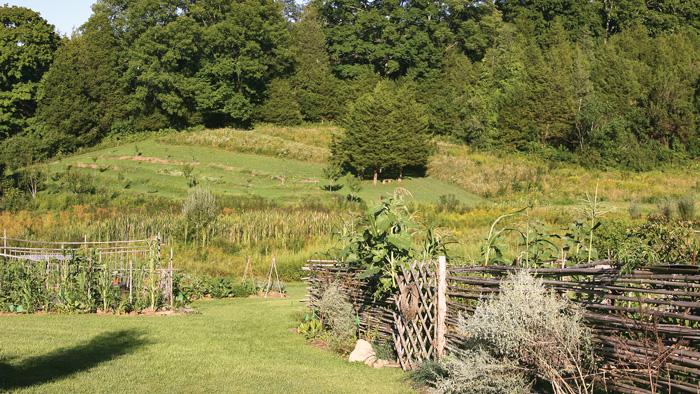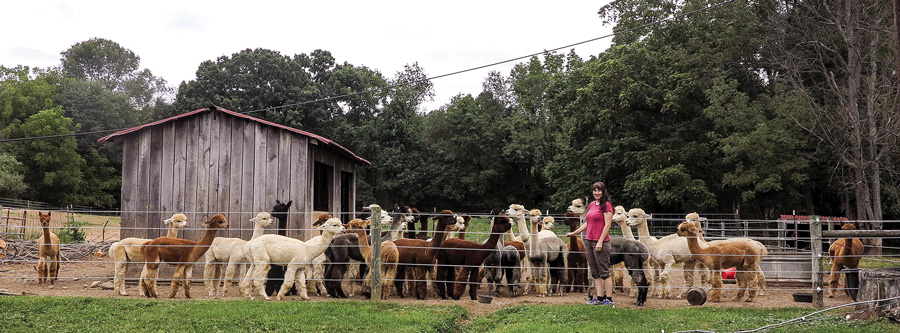
Every day, seven days a week, Natalie and Mike Burger rise at six to walk the pastures to make sure all her eighty alpacas, three Tibetan yaks (one is a bull), forty cashmere goats and Angora goats, and six Teeswater sheep are safe, and that there are no major emergencies. They put out fifty pounds of grain, fill up the hay feeders and water in troughs and buckets. They clean up manure in eating areas and interact with the animals. A couple hours later, Mike heads to his transmission shop in Mine Hill, and Natalie trims up the business end—checking and answering emails, updating animal medical records and births, marketing on social media. She handles orders for the farm’s shop, where she sells articles and everything one needs to turn luxury fibers into luxurious yet practical hats, scarves, socks and gloves and teaches. After lunch and before school lets out, Burger does her fiber art: dying, spinning and weaving. She completes and adds one thing to her shop’s inventory every day. After school is family time followed by the morning’s chores all over again. Some nights, she attends Board of Agriculture meetings and leads a 4-H goat and alpaca club.
Natalie Burger is a farmer and fiber artist, and Secretary of the Sussex County Board of Agriculture. She, with her husband Mike, own Hidden Pastures, a luxury fiber farm where animals and their fur are the products. Burger is among the roughly twenty-two percent women of New Jersey’s 15,936-plus farmers, and their rate is steadily increasing (USDA Census). They come to the land straight from college with ideals and energy to make the world a better place. They retire from corporations to earn a living being outdoors doing what they love, and they come to educate. They are daughters of farmers, and wives of deceased farmers. They all come with grit, knowledge and spirit.
Debra Natyzak uses her dad’s old DeLaval bucket milker, the one he employed here at Valley Fall Farm in Frelinghuysen, where he and his wife arrived in 1930. Debra’s parents were second-generation Ukrainians, where it seems “every family had to have a cow,” she explains. “The mother would go out and milk the cow for the kids.” Her parents ran the farm until they quit in 1975, like most other dairy farmers in the area. “In ‘72 when the oil prices went up, all the farmers went down. Equipment and feed prices went up, everything went up.”
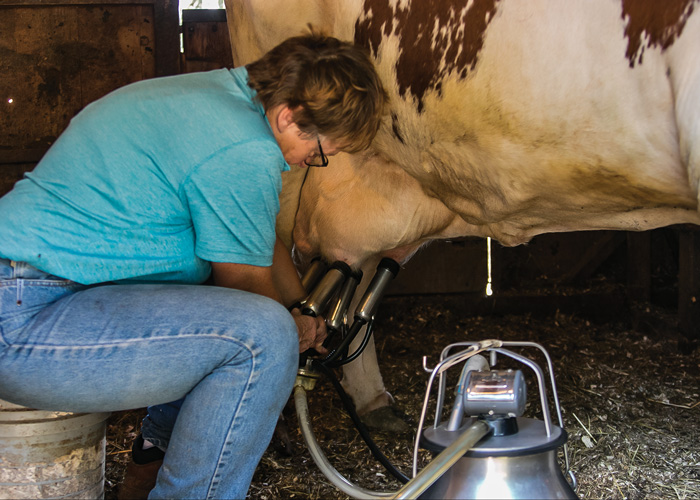
Retired from a career as a chemist at M&M Mars, Inc., in Hackettstown, Debra and her late husband, Roman Oscada, kept Valley Fall productive. Roman grew garlic and harvested honey, and Debra sold eggs from their flock of two-hundred pastured chickens. Their son, Yuri, started them up again with cows twenty years ago in 4-H, milking before he went to school. It was about that time that Natyzak produced a video called Voices of the Land, a lucid narrative — spiced with a series of stories told by local experts, historians, and residents — that communicates her respect and devotion to her lifelong home in New Jersey’s Ridge and Valley. The chronology connects a tiny community, the rivers and valleys around it, and much of the rest of Northwest New Jersey, to timeless and universal origins.
The DeLaval is hooked up to a one-horsepower vacuum pump, and after she attaches tubes to each of the Red and White Jersey’s four teats, Debra switches it on. In five or ten minutes she’s done, much quicker than by hand. She’ll dump the milk into a bucket, filter it, and put it in the fridge. “I’m well stocked for a while,” she says. “You have your own fresh milk, cheese, butter, ice cream and yogurt.”
“The kids that farm today are well-read; they use the Internet,” says Debra. “I’m stuck in the old ways. But if my dad had ten of my cows today, he could have gotten the same amount of milk as he did with forty. He would get a gallon or two a day and here, she gives as much as eleven. The genetics in the cows is insane. Holsteins give the most. The Jerseys have that butter fat, a different texture.”
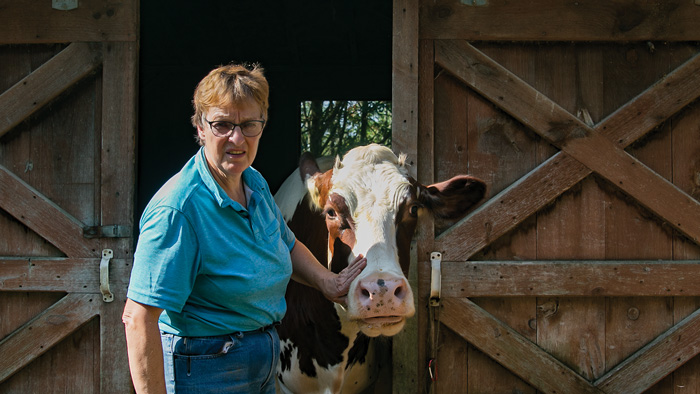
Enter Annie’s Project, a risk management educational organization started in the Midwest to lend support to women farmers. In New Jersey, Annie’s Project teams up with county agents and extension specialists at Rutgers Experimental Stations to teach women the business of agriculture in a series of classes. They specialize in risk management: marketing, finance, personnel, production, and legal issues. Each session is a part of a business plan, so the participant can have a definitive strategy by the end of the classes.
The participants enjoy interacting with other women, says Robin Brumfield, Ph.D., Professor and Specialist in Farm Management and state co-leader. “Farms are fairly isolated, so they like sharing ideas and talking about business plans and getting feedback from the other women.” The women are mostly niche farmers. Products range from sheep, doggie daycare, bee keepers, beef cattle, beach plums, wool, and greenhouse crop.
They also offer social media education and estate planning as a one-day intensive class at three locations in the state, called “Later Life Farming” with a focus on transitioning their farms. Most farmers want to keep farming until they die. “We work with everybody. We’ve been so successful, the women have beaten the door down. We’ve had men wanting to come. We are an affirmative action organization, and so, if men want to come, we help them.”
Nina Stein White, farmer, co-owns Bobolink Dairy and Bakehouse in Milford, New Jersey, with her husband, Jonathan White. “I collaborate and make decisions with my husband on all facets of the operation, from herd management to chicken breed selection. I also run the large garden where we grow tomatoes and herbs for the bakery.” The business is multi-faceted. At Bobolink, they milk thirty-five cows of their own breed, the Bobolink Blacks, a multiple cross with the ancient Kerry cattle of Ireland to produce hand-made, grass-fed, aged raw milk cheeses. They also make bread and pastries with heirloom grains in a wood-fired oven. Their motto may well be: “Creating wholesome food in a sustainable way.”
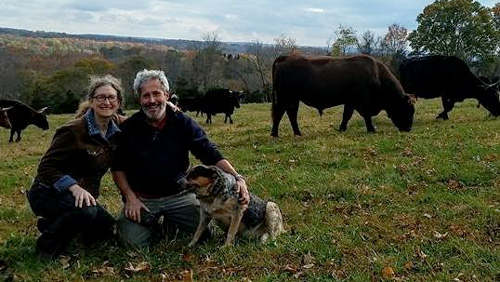
White’s areas of expertise include “developing bread recipes, sourcing the grains, training and supervising bakery staff, and teaching bread classes; growing the vegetable garden, particularly herbs and heirloom tomatoes grown with fertility from their own animals; and managing the cows from breed development to grazing techniques.
“I have always appreciated doing things the old-fashioned way, from hand crafts to home cooking. I have also been obsessed with ethics and environmental issues since I was ten.” White never did or didn’t do something because she is a woman. Instead she uses her skills of organization and communication, “and my true caring nature to create a great day environment for our workers to excel.” She derives her greatest pleasures in leaving the world a better place than when she began work. Her biggest challenge? “I live to work. Sometimes I get tired before the work is done!”
Love for the land and all it contains is a spiritual aspect of nurturers. Learning and teaching these messages can be daunting and joyful, as the Whites know, as do Sister Miriam MacGillis and the staff at Genesis Farm in Blairstown. Genesis Farm was founded as a project of the Dominican Sisters of Caldwell in 1980, when the conditions of farming and food were not as well understood as they are today. In 1972 Miriam had begun to study agricultural systems and how they drive production and distribution, both locally and globally. Genesis Farm was created to focus on those systems, as well as on the alternatives to industrialized farming being carried by the agrarian movement and the diverse associations of organic farmers and advocates.
When Heinz Thomet, a young Swiss biodynamic farmer came to the farm in 1985 they began a biodynamic market garden based on the spiritual, agricultural insights of Austrian philosopher, Rudolf Steiner. In 1988 this vegetable production morphed into the CSG at Genesis Farm, the first agricultural model of Community Supported Agriculture (CSA) in New Jersey, and the sixth in the country.
Judy Von Handorf, now greenhouse caretaker, joined the effort at the beginning. Presently, with Smadar English, both women play key roles, not only in the farming but also through the internship program which has trained aspiring new farmers, many of them women. “Women are more drawn to small, sustainable agriculture. We are nurturers, and this is all about nurturing,” says Smadar. Hannah Hobbes, who spent two seasons interning at the CSG is now employed full-time and in turn helps to nurture and mentor the present interns, including McKenna Oettinger, from Bergen County.
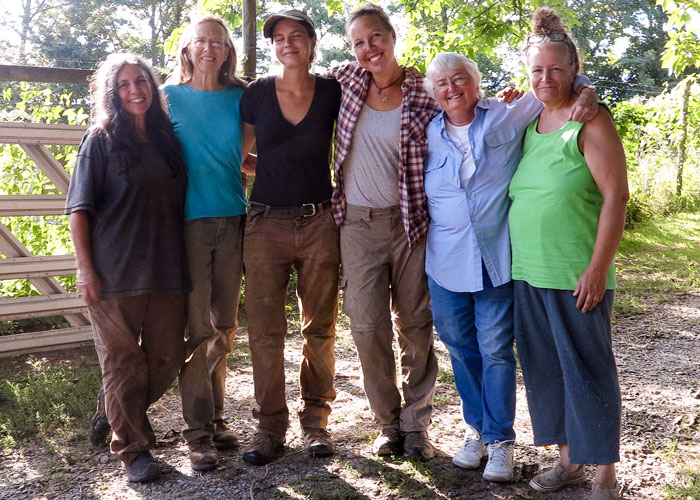
For thirty-six years, and continuing into the present, Genesis Farm has explored the deeper ecological and social issues of our time. Miriam believes that most of the crises we currently face have their roots in an outdated Western worldview—or cosmology—that considers human beings as inherently separate from everything else because each human has a spiritual soul, while everything else is simply physical matter. “This belief,” she suggests “is inconsistent with the scientific discoveries of a single, evolving Universe. The study of this new cosmology sheds light on the deeper root causes of the industrialized agricultural systems that are destroying the air, soils, water, seeds and foods of the planet.” She suggests that this inconsistency is also at the heart of the chemical toxicity, racism, war making, poverty and injustice that threatens the very life of Earth.
In 1990, Genesis created adult residential programs to explore this scientific evidence, through accredited courses in a new discipline called earth literacy, drawn principally from the writings of cultural historian Thomas Berry and mathematical cosmologist Brian Swimme. These programs also focused on bioregionalism and developing a “sense of place” with a need to re-invent agriculture, economics, health, education and the full range of human enterprises as derived from Earth itself. They continue this work today through demonstration gardens coordinated by Linda Kiernan, who incorporates the principles of Biodynamics into “backyard” gardening, and seed saving. The landscape and gardens emphasize the importance of spiritual renewal through honoring the seasons, the diverse communities of nature and advocating against its desecration by the persistent use of poisons.
“We are all of us part of the past, the present and the future, ” says Miriam. “We are all one community, but this has vast implications…”
